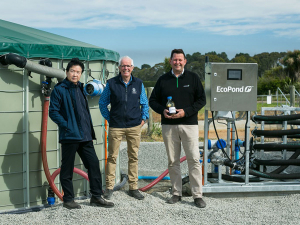Ravensdown partners with Footrot Flats to celebrate Kiwi farming heritage
Ravensdown has announced a collaboration with Kiwi icon, Footrot Flats in an effort to bring humour, heart, and connection to the forefront of the farming sector.
 Lincoln University professors Hong Di, left, and Keith Cameron with Ravensdown's Carl Ahfield. The team responsible for the Cleartech effluent management system has now unveiled EcoPond, claimed to be a breakthrough in methane mitigation. Supplied. Tony Stewart/Photoshots
Lincoln University professors Hong Di, left, and Keith Cameron with Ravensdown's Carl Ahfield. The team responsible for the Cleartech effluent management system has now unveiled EcoPond, claimed to be a breakthrough in methane mitigation. Supplied. Tony Stewart/Photoshots
Ravensdown has unveiled new methane mitigating technology that it claims virtually eliminates the methane emitted from effluent ponds.
Ponds are the second largest source of methane on a dairy farm – behind direct emissions from the animals themselves. Ravensdown says its Eco- Pond system could cut total farm emissions by 4% to 5%.
It also reduces odour and risk of phosphate loss from pond effluent when spread on farm.
EcoPond was unveiled recently at Lincoln University’s Dairy Research Farm. It is an offshoot of Ravensdown’s award-winning ClearTech effluent recovery system and was developed in conjunction with the same team of Lincoln University’s Professor Hong Di and Emeritus Professor Keith Cameron.
The automated “plug and play” in-line system can be retrofitted to existing ponds and uses the same ferric sulphate additive as ClearTech, metered into the pond by a computer-controlled pump and mixing system.
Cameron says the larger the pond, the more micro-organisms there are in the pond to generate methane.
“This new system has been tested in the lab and at farm scale, where it proves enormously effective at essentially nullifying the methane-creating process.”
Di adds that EcoPond reduces the risk of Dissolved Reactive Phosphate loss to water by up to 99%.
The EcoPond is available for farmers to use now. Ravensdown general manager innovation and strategy Mike Manning says the New Zealand dairy sector is already a world leader in carbon emissions efficiency, but the country has set a 10% target of biogenic methane reduction by 2030.
“This new tool in the farmer’s toolbox has the benefit of robust science behind it and will assist farmers who want to start tracking towards that target now,” he says.
Overseas Trade Minister Todd McClay says he's working constructively with the Labour Party in the hope they will endorse the free trade agreement (FTA) with India when the agreement comes before Parliament for ratification.
Donald Trump's latest tariff tantrum has again thrown the world of trade into a new round of turmoil and uncertainty, and NZ is caught up in it.
The third edition of the NZ Dairy Expo, held in mid-February in Matamata, has shown that the KISS principle (keep it simple stupid) was getting a positive response from exhibitors and visitors alike.
Twenty years ago, South African dairy farm manager Louis Vandenberg was sent to a farm in Waikato to provide training on Afimilk technology.
Strong farmgate milk price is helping boost investment on farms, says PGG Wrightson chief executive Stephen Guerin.
Fonterra's 460 milk suppliers in Australia, who will switch to Lactalis end of this month, are unfazed with the impending change.

OPINION: A mate of yours truly reckons rural Manawatu families are the latest to suffer under what he calls the…
OPINION: If old Winston Peters thinks building trade relations with new nations, such as India, isn't a necessary investment in…